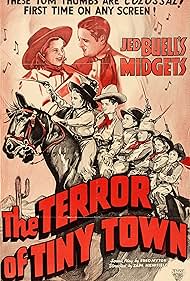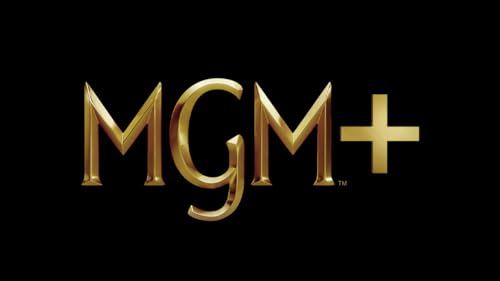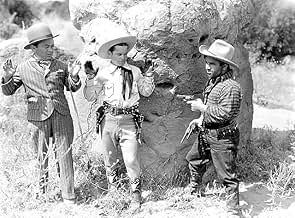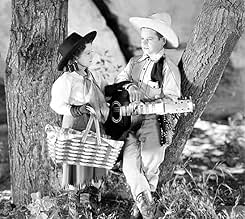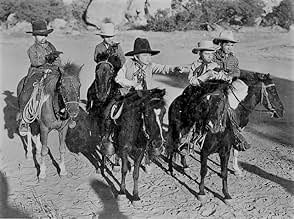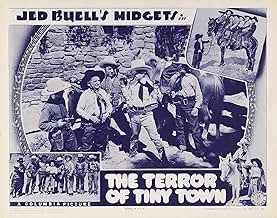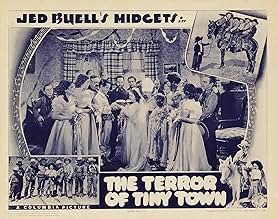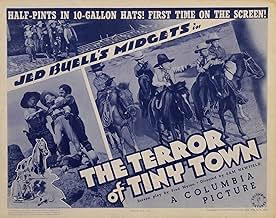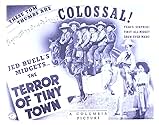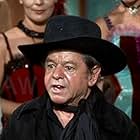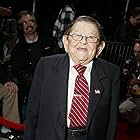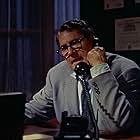An evil gunslinging midget comes to terrorize the good little people of Tiny Town. The townspeople organize to defeat him, and zany antics ensue.An evil gunslinging midget comes to terrorize the good little people of Tiny Town. The townspeople organize to defeat him, and zany antics ensue.An evil gunslinging midget comes to terrorize the good little people of Tiny Town. The townspeople organize to defeat him, and zany antics ensue.
- Director
- Writers
- Stars
'Little Billy' Rhodes
- Bat Haines - The Villain
- (as Little Billy)
Billy Platt
- Jim 'Tex' Preston - The Rich Uncle
- (as Bill Platt)
John T. Bambury
- Pop Lawson - The Ranch Owner
- (as John Bambury)
Karl 'Karchy' Kosiczky
- Sammy - The Barber
- (as Karl Casitzky)
Fern Formica
- Diamond Dolly
- (as Johnnie Fern)
William H. O'Docharty
- The Old Soak
- (as W.H. O'Docharty)
Franz Balluck
- Villager
- (uncredited)
Josefine Balluck
- Villager
- (uncredited)
Christine Buresh
- Villager
- (uncredited)
Lida Buresh
- Villager
- (uncredited)
Stephen Chase
- Master of Ceremonies
- (uncredited)
- Director
- Writers
- All cast & crew
- Production, box office & more at IMDbPro
Featured reviews
Frankly, everything has already been said by previous users. Yes, it's ludicrous. Yes, it's boring. Yes, it's clichéd. Yes, it's badly acted.
But, COME ON, this was intended as a Columbia "C" filler to begin with. Think about it....... "Oz" was already filming, or soon to start, with ALL of these actors as "Munchkins." (Well, "Tex" isn't in "Oz," but every other name appears.) What better way to get some cheap studio material into the theaters? The little people were already making news in the trades.....you'd better BELIEVE Columbia utilized the situation.
Charles Becker, as the cook, has some funny moments, considering the quality of every other performance. And, Billy Curtis, as the hero, actually comes across as a miniaturized version of the standard Hollywood Western star.
As a curiosity, it is definitely worth watching once, with friends and a few margaritas.
But, COME ON, this was intended as a Columbia "C" filler to begin with. Think about it....... "Oz" was already filming, or soon to start, with ALL of these actors as "Munchkins." (Well, "Tex" isn't in "Oz," but every other name appears.) What better way to get some cheap studio material into the theaters? The little people were already making news in the trades.....you'd better BELIEVE Columbia utilized the situation.
Charles Becker, as the cook, has some funny moments, considering the quality of every other performance. And, Billy Curtis, as the hero, actually comes across as a miniaturized version of the standard Hollywood Western star.
As a curiosity, it is definitely worth watching once, with friends and a few margaritas.
I watched this in preparation for Herzog's dwarf film. He requires some time in the wilderness.
In the early 30's there were some precode films that copied already established genres but with toddlers playing the roles. I commented on two: "War Babies" and "Runt Pages." Recently, I saw "Baby Geniuses," which borrowed heavily in spirit — but without the sex jokes.
This is also modeled in a way on those, but is schizophrenic.
It was the same year that "Wizard of Oz," used little people in a serious way to introduce the distorted magic of Oz. (This was before we could rely on Dr Suess.) Nearly all of these actors were in that scene, with its grueling shoot. The actual story is played almost perfectly straight. A standard script is used: cowboy romance, "Romeo and Juliette" family feud and romance, cattle rustling, corrupt sheriff, barroom moll... the whole works. These actors and the director take the movie seriously.
On the other hand, a different director managed the musical numbers. There are a half dozen, and the novelty of little people is played to the hilt, using some actual children I think where cuteness is required. The shift in stance is radical. You can see that distributor realized that they had a problem, so here is what they did:
At the beginning, an announcer comes on "stage" to announce that we would see a "novelty picture" with "midgets." A one of a kind, first ever, he effuses. But he is interrupted by the actor playing the hero, who assures him that the movie is not a novelty but a real film. Then he and the film's villain engage in a bit of scripted verbal slapping that someone thought was a successful synthesis of worlds.
Here's what interests me: mainstream movies have only a few seconds to work with the viewer to establish where what the world is they are entering and where they stand in it. It is critical to the success of a film that this is right. It is why genres are so strong film; there is no relief from the moving forward of the narrative. Big films today can do that by showing a synopsis of the whole movie in the long trailers we have. And title sequences have become extremely effective: an art in itself.
By here in 1938, they took those few precious minutes for this strange dialog.
Ted's Evaluation -- 2 of 3: Has some interesting elements.
In the early 30's there were some precode films that copied already established genres but with toddlers playing the roles. I commented on two: "War Babies" and "Runt Pages." Recently, I saw "Baby Geniuses," which borrowed heavily in spirit — but without the sex jokes.
This is also modeled in a way on those, but is schizophrenic.
It was the same year that "Wizard of Oz," used little people in a serious way to introduce the distorted magic of Oz. (This was before we could rely on Dr Suess.) Nearly all of these actors were in that scene, with its grueling shoot. The actual story is played almost perfectly straight. A standard script is used: cowboy romance, "Romeo and Juliette" family feud and romance, cattle rustling, corrupt sheriff, barroom moll... the whole works. These actors and the director take the movie seriously.
On the other hand, a different director managed the musical numbers. There are a half dozen, and the novelty of little people is played to the hilt, using some actual children I think where cuteness is required. The shift in stance is radical. You can see that distributor realized that they had a problem, so here is what they did:
At the beginning, an announcer comes on "stage" to announce that we would see a "novelty picture" with "midgets." A one of a kind, first ever, he effuses. But he is interrupted by the actor playing the hero, who assures him that the movie is not a novelty but a real film. Then he and the film's villain engage in a bit of scripted verbal slapping that someone thought was a successful synthesis of worlds.
Here's what interests me: mainstream movies have only a few seconds to work with the viewer to establish where what the world is they are entering and where they stand in it. It is critical to the success of a film that this is right. It is why genres are so strong film; there is no relief from the moving forward of the narrative. Big films today can do that by showing a synopsis of the whole movie in the long trailers we have. And title sequences have become extremely effective: an art in itself.
By here in 1938, they took those few precious minutes for this strange dialog.
Ted's Evaluation -- 2 of 3: Has some interesting elements.
Ok, so when I voted I gave it a low score, but that was cause Terror of Tiny Town has very little cinematic merit. But put all that aside and wind your sense of humour down a couple of notches and this movie is a "rootin, tootin, shootin" good time. I mean come on! They walk UNDER the saloon door! They ride ponies! It takes two midgets to play the bass! The bartender can't seem to chug his beer without outbursts of laughter! Plus- midgets fighting- funny! Add to that the fact that not a single one of the midgets can act and you've got 63 minutes of fun! Ok, so I realize that this movie is so politically incorrect that "little people" everywhere are either laughing themselves to death or up in arms. But that shouldn't stop us from enjoying an entirely midget western with multiple ear shattering musical numbers and the barest traces of a plot. But like I said before- midgets-Funny!
7tavm
Okay, so I just watched this all-Midget (sorry, Little People) Western. Now, while I laughed at some of the way their sizes were exploited like when one fell carrying some boxes that blocked his face or when a townsperson drank a giant glass of beer (I think Jerry Maren played the latter by the way), overall I don't think this deserves the moniker of one of "The Fifty Worst Films of All Time" as implied in the book of that name. In fact, for the most part I was quite excited at the way the whole thing was filmed and liked many of the performances especially Billy Curtis as the Hero, Buck Lawson, and "Little Billy" Rhodes as the Villain, Bat Haines. They have a great fight scene at the climax. Yvonne Moray as the Heroine, Nancy Preston, and Nita Krabs as the Dance Hall Girl, Nita, who loves Bat are also good in their roles. And then there's Charles Becker as the Comic Relief, Otto the Cook, who has a pretty intentionally funny scene with a duck he's trying to kill as he tries to sweet talk him. The singing is wonderful, too, though hearing an obviously taller male voice coming out of Curtis' mouth was pretty strange especially in contrast to Ms. Murray's natural warbling voice after that. By the way, the only actual tall person that appears is in the beginning when an announcer steps from behind the curtain to introduce the Hero and Villain (with the requisite "boos" and "hiss"!) before the opening credits. So on that note, I'd recommend The Terror of Tiny Town to anyone who likes a good-old fashioned musical western starring talented little people.
This movie has all the classic elements usually found in westerns of the 1930's - 1950's. The dashing hero, the fair damsel in need of rescuing, the despised villain, singing, dancing, the big chase scene. It's all here. But, the one thing that separates this movie from any other western is the cast. 100% midgets. Yep, this entire movie is cast with actors under the height of 4 feet 8 inches, with a couple of fellas who just might make three feet.
The hook of this movie is the fact that it's all midgets. The dialog and actions could be found in any western made in this time period. Nothing is outstanding about this movie, but then nothing is bad about it. It's just something different. Although, you haven't seen a true chase scene until you see a group of guys chasing each other on Shetland ponies.
The hook of this movie is the fact that it's all midgets. The dialog and actions could be found in any western made in this time period. Nothing is outstanding about this movie, but then nothing is bad about it. It's just something different. Although, you haven't seen a true chase scene until you see a group of guys chasing each other on Shetland ponies.
Did you know
- GoofsWhen Haines arrives at Preston's ranch, he ties his horse securely to the hitching rail. When he leaves a minute later, he mounts his untied horse.
- Quotes
[first lines]
Master of Ceremonies: Ladies and gentlemen and children of all ages, we're going to present for your approval a novelty picture with an all-midget cast, the first of its kind to ever be produced. I'm told that it has everything, that is, everything that a western should have.
- ConnectionsEdited into Speak of the Devil (1993)
- SoundtracksMister Jack and Missus Jill
Written by Lew Porter
- How long is The Terror of Tiny Town?Powered by Alexa
Details
Box office
- Budget
- $100,000 (estimated)
- Runtime1 hour 2 minutes
- Color
- Aspect ratio
- 1.37 : 1
Contribute to this page
Suggest an edit or add missing content

Top Gap
By what name was The Terror of Tiny Town (1938) officially released in India in English?
Answer